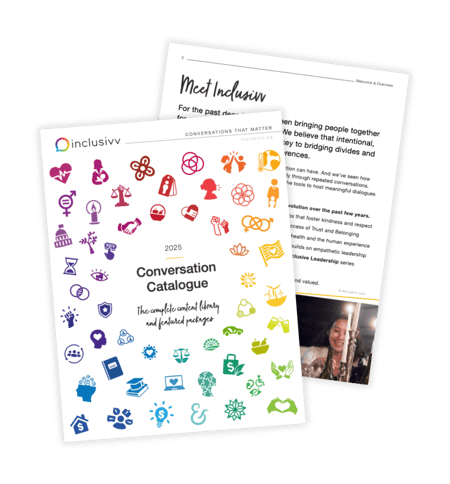Think about the last truly meaningful conversation you had at work.
One where people felt heard.
Where ideas were exchanged honestly.
Where something shifted... not just in what people thought, but in how they felt.
Chances are, that conversation didn’t happen by accident.
It was likely facilitated, consciously or not, by someone who knew how to create space for dialogue, reflection, and connection.
In a world filled with meetings, memos, and Slack pings, facilitation is the overlooked skill that turns communication into transformation.
So what exactly is facilitation, and why does it matter more than ever?
Let’s explore.
What Is Facilitation, Really?
Facilitation is the practice of guiding a group conversation in a way that encourages openness, inclusion, and meaningful participation. It’s not about giving a lecture or leading a meeting. It’s about hosting a space where people feel safe enough, and brave enough, to speak honestly and listen fully.
A facilitator’s role isn’t to tell people what to think. It’s to help people think together.
This might look like:
-
Encouraging quieter voices to speak up
-
Naming and navigating tension when it arises
-
Holding a pause when emotions show up
-
Asking better questions that spark deeper reflection
Facilitators don’t hold all the answers. But they do hold the room.
Why Facilitation Matters Now More Than Ever
Workplaces today are more complex than ever. Teams are more diverse, distributed, and under pressure. Add in sensitive topics like equity, change, and mental health, and it's easy to see why skilled facilitation is no longer optional. It’s essential.
Here’s why.
1. Dialogue Builds Culture
Policies alone don’t change culture. Conversations do.
Specifically, peer-to-peer conversations, the kind where people can share lived experiences, explore new perspectives, and build trust across differences.
Research shows that facilitated dialogue leads to:
-
Increased employee engagement and retention
-
Stronger alignment with organizational values
-
Higher rates of behavior change and collaboration
And unlike top-down communication, these conversations foster true belonging.
2. Psychological Safety Fuels Innovation
Innovation doesn’t happen when people are afraid to speak.
It happens when people feel safe enough to share half-formed ideas, name problems, and challenge each other respectfully.
Facilitators help build psychological safety, which studies have shown is one of the top predictors of team performance.
In psychologically safe spaces, teams are more adaptable, more creative, and better at solving real problems.
3. Conflict Isn’t the Problem. Silence Is.
Disagreement is inevitable... and often necessary.
But without facilitation, conflict can either go unspoken or explode.
Facilitators know how to recognize different conflict styles (avoiding, accommodating, competing, etc.) and respond in a way that keeps the group grounded. They guide conversations through discomfort, helping people stay present instead of shutting down.
Handled well, these moments don’t weaken teams.
They deepen trust.
The Mindsets of a Great Facilitator
Being a good facilitator isn’t about charisma. It’s about how you show up.
Here are six mindsets that strong facilitators embody:
-
Curiosity: They stay open and ask “Can you tell me more?”
-
Empathy: They validate emotions without rushing to fix them
-
Humility: They’re willing to be wrong and learn out loud
-
Courage: They name hard truths and invite reflection
-
Optimism: They believe dialogue can lead to something better
-
Attentiveness: They read the room and adjust in real time
Facilitation is as much about who you are as what you do.
Tools and Techniques for Better Facilitation
If you’re looking to level up your facilitation skills, here are a few go-to tools and strategies.
1. Set the Tone Early
Start by establishing group agreements like:
-
Listen to understand, not just to respond
-
Speak from your own experience
-
Assume positive intent
-
Challenge ideas, not people
These agreements help build trust from the beginning.
2. Ask Open-Ended Questions
Avoid yes-or-no prompts. Instead, try:
-
“What stood out to you?”
-
“When have you experienced something similar?”
-
“How has your thinking shifted on this?”
The right question can change the entire tone of a conversation.
3. Embrace Silence
Not every moment needs to be filled.
Some of the most powerful breakthroughs come after a thoughtful pause.
Learn to sit in the silence and trust the process.
4. Make Space for All Voices
People process differently. Use small groups, writing prompts, or visual aids to help quieter folks participate. Consider asking, “Is there anyone we haven’t heard from who’d like to share?”
Or simply say, “It’s okay to pass, but we’d love to hear your thoughts when you’re ready.”
5. Close with Reflection and Action
Always leave time for the group to reflect and commit to a takeaway:
-
“What’s one insight you’re leaving with?”
-
“What’s a conversation you want to continue after this?”
-
“What’s one small action you’ll take moving forward?”
Closure helps translate discussion into change.
Real Talk: This Work Can Be Messy
Facilitating meaningful conversations, especially across difference, can be uncomfortable. Things will go off script. Emotions will rise. You won’t always get it right.
That’s okay.
Your job is not to have all the answers.
Your job is to create space for growth.
Sometimes that means slowing down when tension surfaces.
Sometimes it means circling back after harm has occurred.
Sometimes it just means being real enough to say, “I’m still learning, and I missed something there.”
Authenticity beats perfection every time.
Want to Build Your Facilitation Skills?
If you’re reading this and thinking, “Yes, I want to do this better,” you’re not alone.
That’s why we created Facilitation Training—to help people like you feel more confident, prepared, and grounded when leading conversations that matter.
We offer two ways to learn:
1. Live Facilitation Training
Join a live training and get hands-on practice and real-time feedback. It’s ideal if you thrive in a community setting and want to learn by doing.
2. On-Demand Facilitation Training (Coming Soon)
Learn at your own pace with guided video lessons and reflection exercises. Perfect for busy schedules or teams training together.
Interested in either?
Sign up for our live training or join the waitlist for on-demand to get started.
Final Word
Facilitation isn’t about controlling the conversation.
It’s about hosting transformation.
When done well, it can shift culture, deepen trust, and make space for the voices that need to be heard most.
And in today’s world, that kind of leadership is not just helpful.
It’s necessary.



